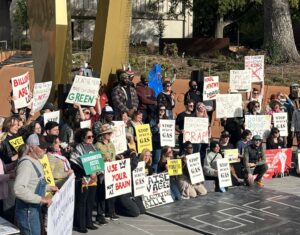 (Raleigh, NC – October 31, 2025) Staff from the North Carolina Justice Center joined partner organizations at the ‘Communities over Profit’ event on Sunday, October 26, to urge Governor Josh Stein and state leaders to stop corporations from being allowed to build a network of new fossil fuel pipelines, gas power plants, and data centers across the state – and having residents pay for it, raising our electric bills even higher.
(Raleigh, NC – October 31, 2025) Staff from the North Carolina Justice Center joined partner organizations at the ‘Communities over Profit’ event on Sunday, October 26, to urge Governor Josh Stein and state leaders to stop corporations from being allowed to build a network of new fossil fuel pipelines, gas power plants, and data centers across the state – and having residents pay for it, raising our electric bills even higher.
Dozens attended the community gathering which featured music, art, a Giant Robot Fight Club face off, and a variety of speakers, including Peter Gilbert, NC Justice Center litigation director. Watch the full clip of Peter speaking below.

During the event, advocates called for the NC Department of Environmental Quality to reject permits for the Southeast Supply Enhancement Project and the Southgate extension of the Mountain Valley Pipeline. Advocates also want officials to ensure that any new data centers are powered by clean energy and protect farm workers from extreme heat.
Supporters say the projects would provide energy to data centers while corporations like Amazon, Google and Microsoft build a framework for artificial intelligence technology in the state.
Peter Gilbert’s remarks at the event provided insight on how current energy policies are already hurting struggling communities, and the devastating effect both projects would have on North Carolina communities if approved.
“What we’re seeing essentially is, that the wealthiest corporations are getting a tax break while the poorest folks pay a high percentage of their income on electricity,” Gilbert said. “The more they [corporations] build, the more they make. So, most of your electric bill is not actually just the electricity you’re paying for, it’s their [corporations] expanded capacity,” Gilbert said.
In an interview with Public News Service ahead of the event, Gilbert explained that rising electric rates also increase housing costs, which further burden residents, and contribute to increased fossil fuel use.
 Justice Circle
Justice Circle